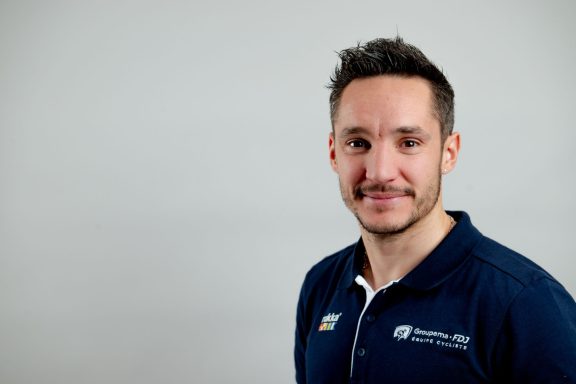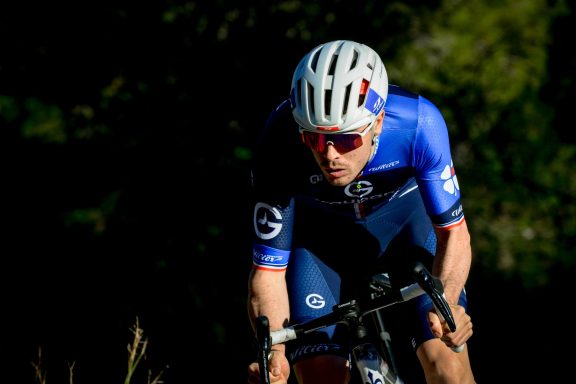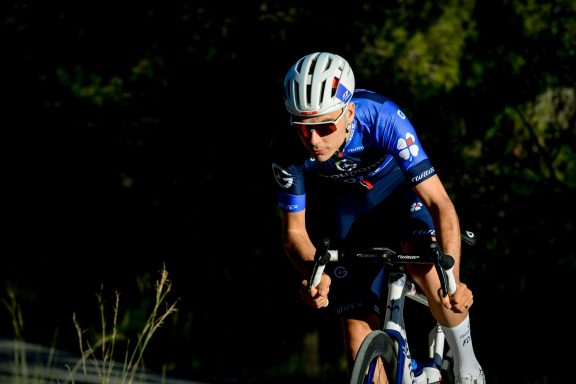When he chose to come all the way from Great Britain to join the Groupama-FDJ’s development team in the winter 2018, some people questioned Jake Stewart’s move. Only a year later, there is no question anymore, as the 20-year-old has managed to establish himself as a key player on Jens Blatter’s team and those questions have been put to rest. We met him after his first race of the season to learn more about him, his background and his future ambitions.
The meeting took place at the home of his fellow countryman and new teammate Lewis Askey – the only one he doesn’t have to speak a “broken English” with. Had the meeting been at his own place, Jake Stewart, energetic drink in hand, would have undoubtedly suggested the chef’s speciality. “I have a real passion for coffee, like most cyclists,” he said. “I have my own machine; I enjoy making coffee and I also spend plenty of time drinking it. That probably comes from my father, who always enjoyed coffee, but I also spent one year in Italy, and Italian coffee is obviously the best coffee in the world. It started from there and developed and developed”. So much so that he became quite particular about the matter. “Trying to find a good coffee in France is hard… If you want a black coffee or an espresso, it’s not so bad, but you don’t want to ask for a ‘Flat White’. In France, everyone would look at you like you’re crazy. They don’t know what good milk in a coffee is (smiles).”
His (only) strength in triathlon
The joking around part over with, Jake Stewart adopts a much more determined tone when telling us about his first steps in cycling. He starts: “I think I’ve always wanted to be a pro cyclist.” At least from the time he realized he had abilities for the sport, which he was first introduced to thanks to triathlon that both his father and his uncle were practising. “I started cycling like that and then I realized that I was rubbish in swimming and running. The only place I was making up time was cycling so I started focusing on that when I was about ten”, briefly sums up the Briton. Then began his real cycling journey in Solihull, on the outskirts of Birmingham, the UK’s second most populated city and the heart of the West Midlands. “When I got to 14-15, I started thinking I should take cycling very seriously to become the best rider I could be,” he recalls. Jake then started proving himself, first regionally and later nationally, and couldn’t escape the radar of the British Cycling institution, which are always looking for new talents, particularly in the prospect of the track and the Olympic Games.
“I moved on to the Great Britain development program then did my first ‘under 23’ year with the Great Britain Academy, where the focus was on track and road”, describes Jake. A good track rider himself and one capable of winning medals on the national and European scenes in the young categories, whether it be on the Madison or in team pursuit, Jake decided nonetheless to gradually move away from the track at 18. “For the Olympic Games, there were boys going way quicker than me, the level of riders above me was so high, he explains. It was not impossible but very difficult to make the selection for the Olympics. So instead of just fighting for a man 5 position on the team pursuit, I preferred to focus everything on the road and try to go WorldTour. I think my focus has always been on the road anyway.”
“A lot of people questioned my move to Groupama-FDJ”
Especially since his ambitions have been met by results; after finishing fifth in the Bergen World Championship in his last year as a junior, the young Englishman started his U23 career in a tremendous way with a second spot in Ghent-Wevelgem and a third place in the Trofeo Piva, two major events in the category: “I think that was when I realized that I could make a career out of cycling. That’s when I kind of put myself on the radar with a lot of teams, including Groupama-FDJ”. Quite at ease in the British Cycling cocoon, where he initially planned to stay an additional year before applying for continental domestic teams, Jake Stewart gambled, according to some, when he chose to go for the French experience.
“Groupama-FDJ contacted me in March and told me about the project, but it wasn’t before October that I finally signed because I was trying to decide what was the best thing for me to do,” says Jake. “When I moved to Groupama-FDJ, there was a lot of questions from the British Academy, the press or just people who follow cycling in the UK. They questioned the move, not only because it was a brand-new team, but also because it was part of a French WorldTeam. And a lot of people in the UK recognize French teams as not suiting British riders very well. But I was happy to make the move; I wanted to get outside of the British scene. I could stay with the British Academy but I would be stuck in the British bubble. I’ve seen riders in the past going from the British Academy to some British continental teams, but the racing scene in the UK is not so good, so it’s hard to progress from a British continental team to the WorldTour. And I wanted to go WorldTour. Therefore, Groupama-FDJ presented a real opportunity; being part of a WorldTour development team, being fully supported by the staff and knowing that, at the end of the contract, there was a potential signing for the WorldTour.”
The mandatory condition for joining the “Conti” is to live in Besançon, France, and therefore to get acquainted with a new culture and a new environment. Quite a piece of cake for Jake Stewart who had already transited through Manchester, Italy and Belgium in his first year with British Cycling. He knew from experience what to expect and how to handle such a situation. “I kind of enjoy living away from home and the independence of it. The only hurdle when you move here is the language, but as soon as you try to get on-board with it, it makes it a lot easier to live abroad.” When he arrived, Jake only had a “basic understanding of French from school”. He today guarantees that he has improved. “I just try to put myself in a situation to learn it, and anyway, sometimes you have no choice,” he smiles. “If I make a mistake, then I make a mistake, but I get corrected then it’s fine”. Something his mates from the development team surely feel free to do.
Making a step forward with the “Conti”
Together with them, Jake produced a very decent first year for the team, also personally making the podium in important events llike Eschborn-Frankfurt and the Triptyque des Monts et Châteaux. “Because it was the team’s first year, no one really knew what to expect, but I think, for a first year, we made it pretty special”, said Jake. “Everyone was coming from different countries, with different culture and with a different vision of cycling, but we all managed to get along pretty well and we had results to share at the end of the season. It was definitely a good year for us and for me as well.” Even though he also grabbed a remarkable third place in the Tour of Flanders U23 with his national team, Jake Stewart above all emphasized the very professional work put into the group’s first season. “We feel like we’re being supported like any WorldTeam riders,” he says. “We’re always supervised. The staff from the WorldTeam passes on its knowledge to the staff of the Conti. The Conti staff knows how they work in the WorldTeam and try to replicate that, which is a huge benefit for us”. Taking into consideration the past season’s achievements and lessons as well as the new recruits, Jake expects an even more successful year in 2020.
“I think we’ve got a really strong team this year, probably stronger than last year, he claims. For sure we’ve got some strong climbers and I think we’ve got some strong guys for the flat as well, especially for the sprint. As a team, we’ll just try to build on the results from last year, trying to get more wins. I think the team wants to be recognized as one of the best U23 teams. I don’t think we really showed that last year, there were teams that were ahead of us, but I’m sure we can have a really good season as a team as long as everyone work well together and everyone pull for each other. In any case, the atmosphere is good, everyone is comfortable with one another and everyone wants to make sacrifices to get the best results as a team.” In 2020 Jake Stewart will mainly race with the development team but he will also join the WorldTeam at some points, like he did mid-February on the Tour of Algarve to kick off his season, taking advantage of the new UCI regulation allowing mother teams to borrow young guns from their development team. “It allows WorldTeams to see for themselves how you deal with the situation and what kind of rider you actually are, rather than just hear it from the Conti staff,” said Jake. “For sure it’s a good experience for the young riders because you can learn so much.”
Drawn to the Classics
No stranger to this kind of experience, having had the opportunity to compete in the Tour of Yorkshire (2018) and the Tour of Great Britain (2019) with his national team in the past, Jake realized yet again on the Portuguese trip just how high the last step was. “It was just my first race of the season and I did not go there in top condition,” he said. “I wanted to help the team more, where I could, but of course you always want to see what you can do. For me it was in sprints. The first day I punctured, unfortunately, and on stage 3, I got myself in a wrong position. It showed me that with the World Tour, if you race with this standard of guys, everything got to be spot on. If you make this mistake in a sprint in U23, it’s not such a big deal, you can recover from it. But in the WorldTour, the race is moving so fast and the level is so high, that even a mistake five kilometers from the finish can cost you a good result.”
For the long term, however, Jake won’t lean towards massive sprints. Although he achieved his best results thanks to his speed, he sees himself moving towards a slightly more specific range. “By no means am I a pure sprinter,” he said. “I am not able to compete with the likes of Jakobsen, Groenewegen. I know I’m not fast enough. I think my strength is after a hard race, if it is from a small group or if it’s been a really hard day, I’ve still got the speed and power to have a quick sprint. My high is in the Classics I believe. That’s where I noticed the best opportunities for me. I demonstrated this in Ghent-Wevelgem, Flanders, and Eschborn-Frankfurt. Those were single-day races where I proved I could kind of excel. I think moving forward that’s the rider I want to focus on and try to become. In the meantime, for this year, I want to build on my results from last year and target some of these Classics. There will also be races like the Tour de Normandie and the Tour de Bretagne. These are stage races but with a hard course so I would like to get some good results, in sprints especially”. From time to time, he will also meet up again with the WorldTeam, as early April, and potentially more over the summer, he hopes. Over time, he will surely have plenty of opportunities to prove himself.




No comment